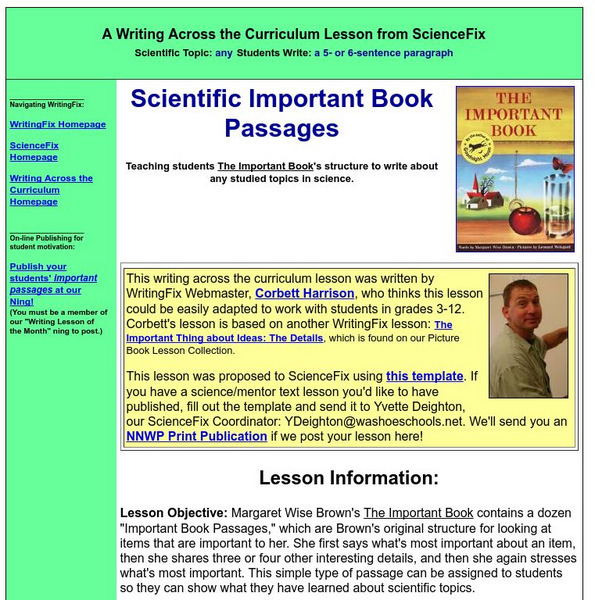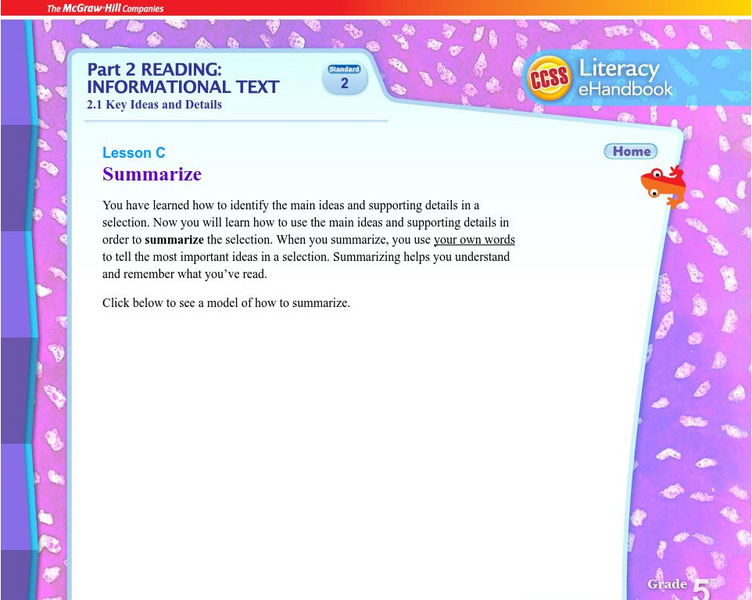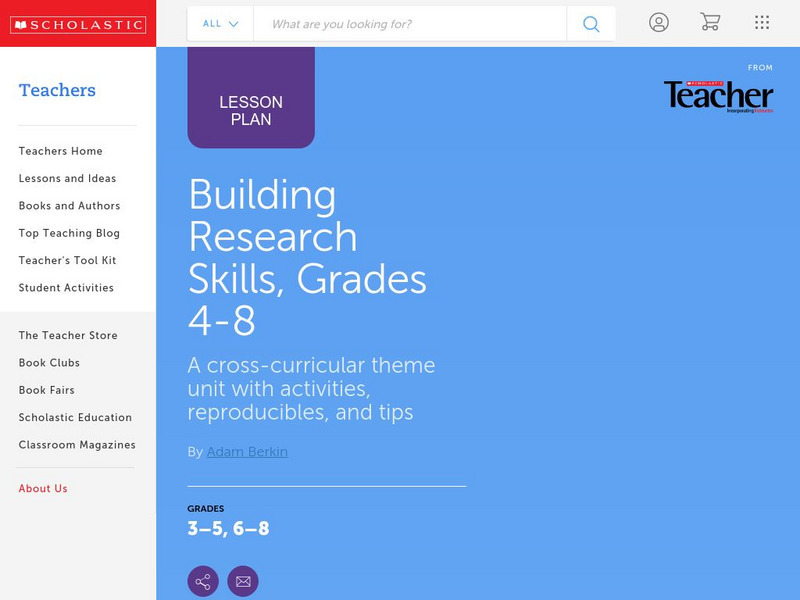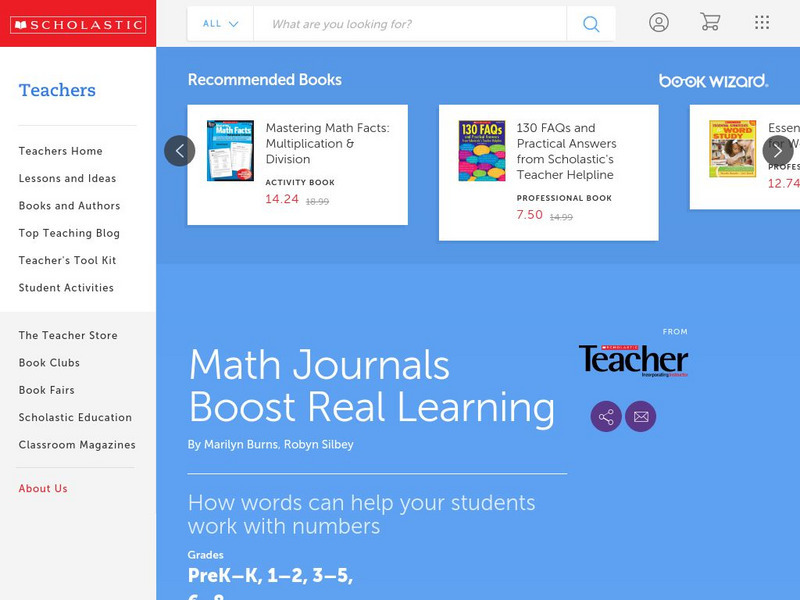Better Lesson
Better Lesson: A Storm of Ideas
The first step in writing an informational text on the topic of learners' choice is helping the student choose a topic of interest. Students will brainstorm ideas that will be possible final topics.
Writing Fix
Writing Fix: Emotions and Colorful Days
In this lesson learners will learn to write descriptively.
Writing Fix
Writing Fix: Who Doesn't Want to Be a Millionaire
Inspired by Barry Lane's book 51 Wacky We-Search Reports, in this cross-curricular instructional activity students learn how to summarize properly.
Writing Fix
Writing Fix: The Wacky Advertisement (With Disclaimer) Activity
Inspired by Barry Lane's book 51 Wacky We-Search Reports, in this cross-curricular lesson plan students learn how to summarize properly.
Writing Fix
Writing Fix: Scientific Important Book Passages
Students read and examine the structure of The Important Book by Margaret Wise Brown and then follow that pattern while writing about the most important things about various scientific topics. Printable handouts and student samples are...
Writing Fix
Writing Fix: Writing Scientific "Recipes"
Adapted from a lesson in the book 51 Wacky We-Search Reports by Barry Lane, this lesson asks students to read several recipes to gain an understanding of how they are written and the types of words they use. Then students demonstrate...
Writing Fix
Writing Fix: Write About Something Real at School
For this Writers Workshop lesson, learners look around themselves and think about their daily lives at school to find relevant writing topics.
Beacon Learning Center
Beacon Learning Center: Web Lesson: Did I Read It: Implicit vs Explicit Details
Follow Carson through a lesson in order to become a better reader of informational text. Learn the difference between implicit and explicit information. Includes multiple interactive assessments and reading activities.
Writing Fix
Writing Fix: The Wacky "I Will Not" Chalkboard
Students can use this writing idea from the book Wacky We-Search Reports by Barry Lane to demonstrate understanding in any content area. Students use the idea of writing "I will not " sentences to show their knowledge of various...
Curated OER
Mc Graw Hill: Part 2 Reading: Informational Text: Connections Within Text
Learn how information in a text can be connected through compare and contrast, cause and effect, and sequence.
Curated OER
Mc Graw Hill: Part 2 Reading: Informational Text: Summarize
Learn how to summarize a text based on the main idea and supporting details you found.
Curated OER
Mc Graw Hill: Part 2 Reading: Informational Text: Summarize
Learn how to summarize a section of a text with this site.
Curated OER
Mc Graw Hill: Part 2 Reading: Informational Text: Show Understanding of Text
This quick activity includes a passage from an information text, and explains reading comprehension strategies to use to answer questions.
Other
Appalachian State Univ.: Journal Reprint: Internet and Blog Publishing [Pdf]
Information, ideas, and examples of how technology can be used in a Social Studies classroom. Although designed for a fourth-grade classroom, many ideas in this article are applicable and adaptable for various grade levels and other...
ReadWriteThink
Read Write Think: Technical Reading and Writing Using Board Games
Contains plans for a game that helps teach technical reading and writing while reviewing a novel that students have read. In addition to objectives and standards, this instructional plan contains links to sites used in the lessons as...
ReadWriteThink
Read Write Think: Using Narrative for Expository Text
Lesson in which students read various narrative texts which provide a context for them to learn content-area topics. Narratives allow the students to begin to understand expository texts.
ReadWriteThink
Read Write Think: Using Science Texts to Teach the Organization of Nonfiction
Contains plans for three lessons that use science textbooks to teach about the organizational features of nonfiction such as labels, captions, headings, and fonts. In addition to objectives and standards, this instructional plan contains...
ReadWriteThink
Read Write Think: Guided Comprehension: Making Connections
Lesson introduces students to the strategy of making connections. Students learn the three types of connections using a double-entry journal. A good resource for teachers.
ReadWriteThink
Read Write Think: Research Building Blocks: Notes, Quotes, and Fact Fragments
Contains plans for a lesson plan on taking notes that is part of a larger unit on researching a state symbol. It works on skills like figuring out what information is relevant and irrelevant, using a variety of sources, and paraphrasing....
TeachEngineering
Teach Engineering: Write On!
In this activity, students create a book, newspaper or other published work to communicate what they have learned about engineering and the environment.
Scholastic
Scholastic: Building Research Skills, Grades 4 8
Students in Grades 4 through 8 will benefit from these research skills activities. This resource provides several learning activities and tips. CCSS.ELA-Literacy.WHST.6-8.7 Conduct short research projects
Scholastic
Scholastic: Math Journals Boost Real Learning
Discover how writing in a journal can boost your students reading skills when you read this article. This article sites ways to integrate writing with teaching math skills.
Read Works
Read Works: Let's Make Dinner!
[Free Registration/Login Required] A literary text about a brother and sister who have to make dinner when their mother is going to be home late. A question sheet is available to help students build skills in reading comprehension.





















